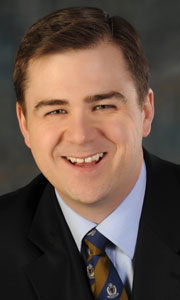Mitt Romney and Barack Obama are deliberately avoiding discussing their religious backgrounds in the current U.S. presidential election campaign because they’re keenly aware of the collateral damage it would cause them both, according to a high-profile political scientist from the University of Notre Dame who will deliver a lecture here next week.
“It’s a lot like the theory of mutually assured destruction that characterized the relationship between the Soviets  and the U.S. during the height of the Cold War,” said David Campbell. “They know that bringing it up can cause the other and themselves a lot of damage.”
and the U.S. during the height of the Cold War,” said David Campbell. “They know that bringing it up can cause the other and themselves a lot of damage.”
Dr. Campbell will deliver a lecture on Oct. 24 at 7 pm called Is 2012 the Year of the Stained Glass Ceiling?: Religion and the U.S. Presidential Election. Co-sponsored by the Political Science department and Assumption University, the lecture – one of the Distinguished Speaker Series – will be held at the Assumption University Chapel. It’s free and open to the public.
An expert on religion and politics, Campbell – who is often featured in such national media outlets as The New York Times, The Economist, USA Today, The Washington Post, The Wall Street Journal, Time, NBC News, CNN, NPR, Fox News, and C-SPAN – said he will give his audience a sense of why he believes religion is being avoided in the current campaign.
He suggested Obama is avoiding the subject because of persistent but false rumours that he’s a Muslim, and because of some of the past controversy that has surrounded his relationship with Rev. Jeremiah Wright. He said Romney is avoiding it because Mormonism is largely misunderstood, pointing to a recent poll which indicated that about 20 per cent of Americans wouldn’t vote for Romney because he’s a Mormon.
“If 20 per cent of the population said they wouldn’t vote for a black man for president, that would be a huge story,” he said.
Campbell, who earned his PhD in political science from Harvard University, is the founding director of Notre Dame’s Rooney Center for the Study of American Democracy. He is the co-author of American Grace: How Religion Divides and Unites Us, which has been described by the New York Times as intellectually powerful, by America magazine as an instant classic and by the San Francisco Chronicle as the most successfully argued sociological study of American religion in more than half a century. The book has also received both the 2011 Woodrow Wilson Award from the American Political Science Association for the best book on government, politics, or international affairs and the Wilbur Award from the Religious Communicators Council for the best non-fiction book of 2010.

